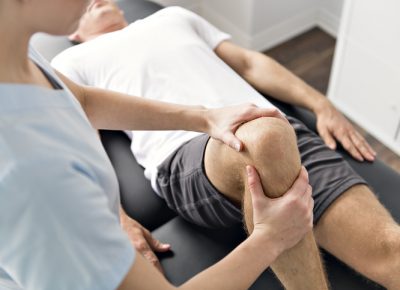Why Should I See a Sports Medicine Physician?

When you hear the term sports medicine, it commonly conjures an image of an elite athlete having their ACL reconstructed by an orthopedic surgeon, or a severe fracture fixed surgically with plates and screws. However, most injuries to the muscles and joints of our body do not require surgery.
Fortunately, there is an entire specialty dedicated to nonsurgical treatments for these types of injuries – Primary Care Sports Medicine. Primary Care Sports Medicine or Sports Medicine specialists undergo primary residency training in a field of general medicine, such as Family Medicine, and then additional fellowship training in sports medicine.
A sports medicine physician has the additional training to treat most injuries to athletes, as well as weekend warriors and even patients who lead more sedentary lifestyles. Sports medicine physicians can diagnose and direct the treatment of sprains and strains to muscles, ligaments and tendons. They can also treat chronic conditions such as joint arthritis.
Non-surgical treatments that can be provided by sports medicine physicians include cortisone injections, viscosupplement injections, manipulative therapy and medications. They can also prescribe additional treatments such as physical therapy. Many nonsurgical sports medicine physicians additionally offer regenerative treatments such as platelet rich plasma injection and stem cell therapy.
With a background in general medicine, nonsurgical sports medicine physicians are also able to address non-orthopedic injuries like concussions. They are also able to help recognize the signs of underlying medical conditions that can cause pain or otherwise affect activity performance. For example, young, female athletes, particularly those in sports like figure skating and gymnastics, can be at risk of stress fractures due to physiologic changes from poor nutrition. Another example is athletes competing in cold weather can have asthma-like symptoms such as coughing and shortness of breath while training without having true asthma. These are conditions that if recognized and treated early can significantly improve performance and keep athletes on the field by avoiding injury.
Nonsurgical sports medicine doctors treat most “orthopedic” injuries without the need for surgery. In addition, they can help monitor the overall health of athletes, identifying potential medical problems that could be lurking under the surface.
And, remember sports medicine physicians are well suited to provide comprehensive medical care for the “non-athlete” as well, and are excellent resources for the individual who wishes to become active or begin an exercise program. For the “weekend warrior” who experiences an injury, the same expertise used for the competitive athlete can be applied to return the individual as quickly as possible to full function.
Common examples of treatment provided by nonsurgical sports medicine physicians include:
- Acute injury treatment (sprains, strains, knee & shoulder injuries and fractures)
- Overuse injury treatment (rotator cuff, tendonitis, osteoarthritis)
- Concussion (mild traumatic brain injury)
- Athletes with chronic or acute illness (such as asthma)
- Nutrition and performance issues
- Exercise prescription for patients who want to increase their fitness
- Injury prevention
- “Return to play” decisions
- Recommendations on safe strength training and conditioning exercises
- Healthy lifestyle promotion
Interested in learning more about services offered at Jersey Shore Sports Medicine? Click HERE.
To schedule a consultation with Dr. Sokalsky, please call the office at 609-904-2565 or click HERE for an appointment.
